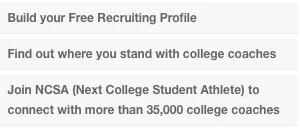Facebook, Twitter, and Athletic Scholarships: 5 Things to Check
If you are a varsity high school athlete with aspirations of playing your sport at the collegiate level and your performance in high school was noteworthy enough to attract college scouts, you need to prepare for the recruitment process.

It is an exciting, heady experience that is designed to sell you on attending a specific college, replete with great coaching, national exposure, hopefully a national title, and a successful college career. In the past, recruiting procedures meant letters of interest mailed to athletes, recruiting phone calls, and a visit to the campus by the recruit, all aimed at discovering whether or not the athlete and school were going to be a good fit.
That Was 10 Years Ago
We live in a world of rapidly decreasing privacy that even the private citizen leading an ordinary life is an open book, and high-profile people like athletes, celebrities, and politicians are under intense scrutiny. When millions of alumni dollars are at stake along with a coach’s career, a school’s reputation, and NCAA eligibility, prospective student athletes are subject to a thorough background check, looking for past indiscretions that would be a potential source of embarrassment to the school or, worse, would result in athletic sanctions.
There are ways to use Facebook in the recruiting process; but with the proliferation of social media and all the information and activities that are discussed on venues like Facebook, Twitter, etc., high school students need to assume that their accounts are going to be reviewed by colleges. Be aware that before contacting college coaches to enter into the active recruiting process, you need to carefully examine and clean up your social media. Here are the main points to consider before contacting college coaches:
1. Remove All References to Restaurants, Products, or Services Before Contacting College Coaches
You are an amateur athlete, not a professional, and your profile can’t appear to be endorsing anyone or anything. However innocent it may seem, know that even the suggestion of endorsement can be spun to make it seem as though the reference is a paid endorsement.
2. Check Out Your Friends and Your Photos
Promptly remove anything that is in the slightest way lewd, suggestive, inappropriate, or shows anything that can be construed as illegal before contacting college coaches. If you need guidance on determining what needs to be omitted, ask a trusted adult for help.
3. Clear Your Facebook Wall and Twitter Feed
Again, remove everything that does not present you as a good citizen before contacting college coaches. You don’t have to be perfect. But you do have to be marketable, and for college, that means wholesome.
4. Unfriend or Unfollow anyone who does not conform to the guideline laid down in no. 3
If you need some help with figuring this criterion out, ask your high school coach for assistance. He or she should be able to review your social media and help you with judgment calls on whom to unfriend and/or unfollow.
5. Set Your Privacy Settings to Fully Private
The greatest cleanup in the world is useless if your privacy settings are not fully private. The issues that you just resolved will come creeping back. Worse, you may have some new “frenemies” who are now angry at you for dumping them and are seeking to damage your reputation. Be vigilant, militant, and practical about guarding your reputation. Remember it only takes a second to destroy a good reputation built over a lifetime. Don’t let it happen to you.
Are you following any colleges on Facebook or Twitter? Have you been able to contact any coaches? Let us know if you have any questions in the comments section below; of course we are on Facebook, Twitter or Google+!


